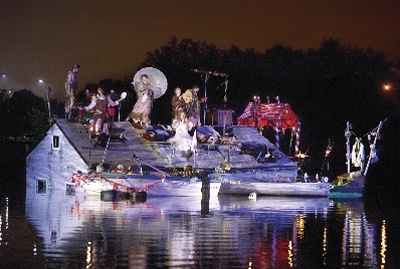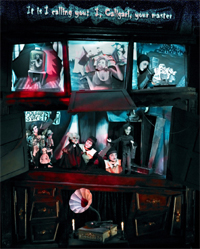
We move to a big circular table nestled among computer workstations where Vanessa Stalling, an artistic associate, sits waiting to talk. I take a chair next to Stalling; Topolosky takes a chair next to me. Stalling is wearing a yellow ruffled shirt and a black sweatshirt. Her hair is cut very short and very close to her head in a way that is both gamine and brisk. Stalling will direct her first Redmoon show, The Princess Club, come fall.
“The Princess Club will be an ensemble show. We’re exploring fairy tales. There’s something incredible, beautiful, and magical about fairy tales, but they tell you really awful things as a woman,” says Stalling, noting the damsel-in-distress, beauty-obsessive world fairy tales promote.
“The women are going to be disfigured with bumps and humps, exaggerated backs and ankles,” she continues. “The idea is that we have distortions from the food that we eat, and women are fed fairytales.”
A man at a nearby computer turns around. His face gives me a vague and creeping sense of doom until I recognize him as “Once Upon a Time’s” villain. It is Seth Bockley, the apprentice director.
“Princess is one of those hot button issues right now,” he says, referencing a recent NY Times article.
Soon Maugeri emerges from the performance. He has dark eyes with long, wet-looking lashes, a startlingly feminine feature in a look that is otherwise very guy: gut, blue jeans, short hair. His wife recently had twins and he is carrying a tubby baby boy wearing a T-shirt that reads “Mom” in gothic, motorcycle-style letters. He sits the baby on the table, pats his stick-out tummy, and coos, “Look at that pot belly.” His wife, who drifts in and out of the room, holds a much smaller girl.
Maugeri created and directed the current show performed with tiny stick puppets in a toy theater. It is about a young girl who learns to listen to the language of birds and fights an evil industrialist/capitalist bird thief. The story is sentimental and simplistic with convoluted turns — the bird thief only turned villainous after being thwarted in good deeds. The words hope and dream pop up more than cuss words in “Goodfellas,” and the entire production is drearily serious.
Redmoon’s bitter edge is what defines and ultimately justifies its fluffy sweetness.
But the toy theater is amazing — intricate and inventive with tiny trapped doors everywhere that reveal small treasures. As with all Redmoon performances, after the show they invite the guests to come up close and peer at the marvels of the tiny contraptions and compartments.
“Once Upon a Time” is something of a goody-two-shoes sibling to 2005’s “The Cabinet,” a miniature spectacle performed out of an actual cabinet. It was Maugeri’s dark and wicked adaptation of the German expressionistic film “The Cabinet of Dr. Caligari.”
However, Redmoon’s bitter edge is what defines and ultimately justifies its fluffy sweetness. It was the beauty of a the acid-folk group The Bitter Tears singing, “It’s a death-filled world” to hordes of children in Millennium Park during the summer spectacle.
It’s what separates art from kitsch. It’s harnessing the evocative power of sentimental beauty and nostalgia to tell a story that is neither sentimental nor nostalgic.
It’s the difference between the meticulously crafted public spectacles that Redmoon creates and the private functions they perform at to help finance the spectacles, where performers are largely baubles.
Nonetheless, Redmoon for Hire has, in addition to corporate backers and government grants, been a major contributor to Redmoon’s current finances.
“They’re definitely a lucrative non-profit; they get HUGE sums of money from the city and private benefactors. They spend gargantuan amounts on shows and materials,” says the ex-intern. In 2002, the organization surpassed $1 million in revenue.
 “We’re trying to put our energy into how to create a sustainable theater that creates spectacle nationally and internationally. We want to be the nation’s spectacle makers, spreading out our numbers so when we’re requested to take the place we can,” says Maugeri. “We’re not afraid of losing anythingl we see the potential and we’re not afraid of maximizing the potential.”
“We’re trying to put our energy into how to create a sustainable theater that creates spectacle nationally and internationally. We want to be the nation’s spectacle makers, spreading out our numbers so when we’re requested to take the place we can,” says Maugeri. “We’re not afraid of losing anythingl we see the potential and we’re not afraid of maximizing the potential.”
“At the same time,” he adds, “we’re not concerned with the kind of professionalism that a lot of other theater companies are concerned with — having a season for one. Redmoon has always been very open door, really casual. You can come in, put your hands on stuff. I don’t want to be the kind of place where you have to wear a suit and bring in a portfolio to work on stuff.”
He pauses as his wife enters to collect the slumbering baby and leave.
“Do you need any help?” he asks.
“No,” she responds, settling the two infants into a more manageable position. A back and forth of “fine” and “sure?” ensues, ending with Maugeri looking at us and saying, “I’m going to help her anyway,” and momentarily vanishing.
“Where were we?” he asks upon return.
“About not professionalizing?” I say.
“Ah,” he pauses, and then adds, “I just want to make sure we get it clear. The theater is not resisting becoming professional. We’re all about professionalism if it’s defined as appropriate structures to the medium. We’re not resisting.”
I ask if he fears the organization becoming what groups Cirque Du Soleil or Blue Man have become. “It must be nice to have such a lucrative base,” he replies. “It has liberated the key artists and they have an army of performers getting steady work. I wouldn’t want to do with some of the things they do, like staging a back-up show for Celine Dion in Las Vegas. I hate Las Vegas. It’s a tough town — one of the saddest places I’ve ever been.”
He glances at Topolosky, and laughs, “Should I not be saying that? Don’t write that down. I love the shows. I love the people. I love the buffets.”
– Story by Kim Velsey, first photo by Sean Williams
